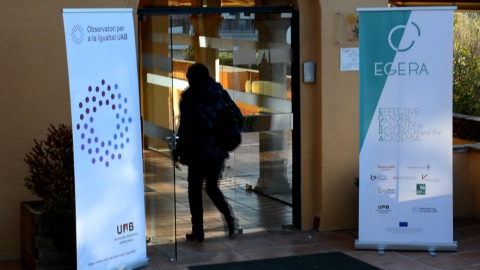The EGERA project to continue at UAB

10/03/2016
The Effective Gender Equality in Research and Academia project, also known as EGERA, made its last stop at Universitat Autònoma de Barcelona on 18-20 January to hold an internal meeting between the 8 partner universities.
Torre Vila-Puig¸ home to the ‘Friends UAB’ association, was the venue for the workshop and welcomed up to 30 people during three days, including members from the partner institutions and the project’s coordination committees, such as the Advisory Committeeor the Steering Committee.
Besides the people who was directly linked to the project, professor Maria Bustelo, head of the Equality Unit at the Complutense University of Madrid and an expert in gender, governance, and evaluation, was invited to talk about “the importance that any evaluation must not only be accountable but also a learning tool”.
The workshop was opened by the UAB Rector, Ferran Sancho; the Research Vice-Rector, Pilar Dellunde; the project’s coordinator, Hélène Périvier; Agnès Hubert, member of the Advisory Committee and BEPA counsellor; and Teresa Freixes, Director of the UAB Observatory for Equality.
The main topics for discussion were the wording of a Charter for Gender Sensitive Governance and Evaluation of Research in Universities and the creation of a Database of Good Practices of Gender Sensitive Research. This future charter on gender and governance is promoted by Science Po (Paris), but all EGERA partner universities are also adhered and will sign it by the end of May 2016. The charter aims at encouraging the signatory universities to strive to an equal access of women to decision-making positions at universities, as well as reducing gender bias in the evaluation of research and teaching conducted by universities.
The assistants also agreed upon the criteria to select the good practices in Gender Sensitive Research. In that vein, the Observatory for Equality will gather the good practices from all EGERA partner universities throughout 2016, and these will be assessed and included afterwards in a database to be delivered to the European Commission for future awareness-raising actions and training. Good practices in gender in research include initiatives, activities and research projects which have encouraged and strengthened gender perspective and dimension in research and represent a progress within their field in the analysis and gender dimension, along with processes and actions carried out by universities and research groups and units to foster women’s leadership in research projects and a balanced proportion of women and men in research teams.
The EGERA project within the UAB will continue its contribution to implement the III Action Plan for Equality between women and men at UAB until its end date at the beginning of 2017. It is specially targeted to develop measures on gender perspective in research and teaching, and to train and counsel students, research staff and research groups who may be interested. Other tasks of the project will still be conducted, such as the Second Survey on Gender Culture at UAB and the Third Report on Gender Equality at UAB.
If you would like to send us information on activities and research projects likely to be assessed and included within the good practices, write an e-mail to: pr.egera@uab.cat. For further information about the measures of the III Action Plan for Equality between women and men in cooperation with the EGERA project, click here.
Here you have access to the video summary of the workshop.